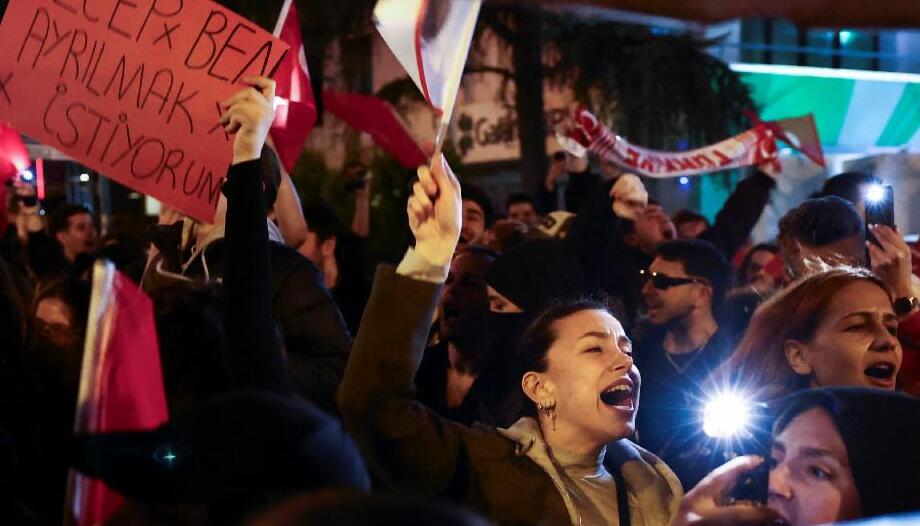- Jonathan Luxmoore, OSV News
Turkish Catholics and Christian minorities are fearful of the unrest that has followed the March 19 arrest of a major opposition leader, Ekrem Imamoglu, the elected mayor of Istanbul and a "practicing Muslim, but secular mayor.
"Our church is not in anyone's direct crosshairs, as it is an insignificant presence here, but it is Catholics from all over the country are now afraid," a church source told OSV News.
It was not a surprise
"The management of power in Turkey and throughout the Middle East is tied to individuals and groups with no real understanding of democracy. So what is happening now has not come as a surprise, at least to anyone who has followed events over the years."
The source, who asked not to be named for security reasons, spoke to OSV News as street protests continued over the arrest of Ekrem Imamoglu, Istanbul's mayor-elect and expected presidential candidate, along with dozens of other members of his opposition Republican People's Party.
He said he had heard of no arrests or property damage affecting the country's disparate Catholic communities, nor of direct threats to the Istanbul-based Orthodox Ecumenical Patriarchate and other Christian denominations.
Christians affected
However, he added that all Christian groups had been affected by the worsening political tensions and economic difficulties in Turkey, whose 85 million people are mostly Sunni Muslims.
The Turkish daily newspaper 'Hurriyet' reported on March 26 that more than 1,400 protesters, mostly youths, had been arrested since Imamoglu's detention, and at least 170 were awaiting trial, including several journalists detained in dawn raids.
Much of Istanbul closed
He added that much of Istanbul, a city of 15.7 million people, remained on lockdown, with riot police patrolling with tear gas, water cannons and rubber bullets, and internet and transport connections partially cut.
Meanwhile, AsiaNews, an agency of the Vatican's Pontifical Institute for Foreign Missions, said Turkish authorities had refrained from a total ban on the protests to avoid "provoking excessive popular anger."
The agency added that support for Imamoglu, a "practicing Muslim but secular mayor," remained strong in an Istanbul "full of scars and disappointments," and that he sought to revive the secular vision favored by Turkey's modern founder, Mustafa Kemal Atatürk (1881-1938).
Accusations
On March 26, Recep Tayyip Erdogan, Turkey's president, accused opposition politicians of trying to "cover up their own misdeeds" by "hiding behind the youth" and of sabotaging the economy by urging boycotts of pro-government companies and media.
He added that "lawlessness" would be held accountable, and also accused Western governments of double standards for ignoring "acts of vandalism and insults."
"If by democracy they mean allowing thieves, fraudsters and fringe groups to exploit municipalities and public resources, we reject that understanding of democracy," said Erdogan, Turkey's prime minister from 2003 to 2014. Erdogan gained sweeping powers during three subsequent terms as president, surviving a July 2016 coup attempt that left more than 200 dead.
Use of force against demonstrators
In the recent protests, the use of "unnecessary and indiscriminate force" against demonstrators was condemned by Amnesty International, which urged the Turkish government to "respect and protect the right to peaceful assembly."
Meanwhile, Council of Europe Human Rights Commissioner Michael O'Flaherty said he was also concerned about reports of disproportionate use of police force and called on Turkish authorities to "respect their human rights obligations."
Catholic Church: seven dioceses, 54 parishes
The Catholic Church has seven dioceses and apostolic vicariates, with 54 parishes and 13 pastoral centers, in Turkey, a NATO member state. The Church has suffered several outrages, such as the fatal stabbing in 2010 of the president of its episcopal conference, the Bishop Luigi PadoveseThe murder in 2006 of Italian-born Father Andrea Santoro in his church in Trabzon.
Although the country resumed diplomatic ties with the Vatican in 2016, two years after a visit from the Pope FrancisThe church was denied legal recognition and is still trying to reclaim some 200 properties from a list submitted to a parliamentary committee in 2012.
Other historic Christian churches are also trying to reclaim land and property confiscated after the 1923 Treaty of Lausanne, which established the borders of modern Turkey, and face problems recruiting clergy, establishing associations, and obtaining building and renovation permits.
1700th anniversary of the Council of Nicaea
Hopes of a new visit by the Pope in May to commemorate the 1700th anniversary of the Council of Nicea (Greek) in today's Iznik (Turkish), increased following Erdogan's Dec. 26 meeting with Orthodox Ecumenical Patriarch Bartholomew of Constantinople, although the Vatican has not confirmed any plans. Pope Francis expressed his desire to go in November, but it remains unknown whether his health will allow him to do so.
In his interview with OSV News, the church source said that "deep divisions" seemed to persist in Turkish society as Erdogan pursues policies driven by "nationalism and Islam."
Fear of speaking out, and denouncing ambiguities
"Certainly, much of the population disapproves of his mixing of politics and religion, but most people also know the negative consequences of speaking out," the source said.
"Even among Western Christians, attitudes remain ambiguous. On the one hand, they organize tearful prayer vigils for Christians in the Middle East. On the other, they politically support governments that do business with Turkey."
OSV News did not receive a response to requests for comment on the current situation from the Turkish bishops' press office and several prominent church communities in Istanbul.
—————
Jonathan Luxmoore writes for OSV News from Oxford, England.
This text is a translation of an article first published in OSV News. You can find the original article here.









